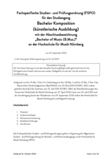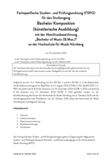for studies starting in winter term 2020/21 Subject-specific study and examination regulations (German)
The subject-specific study and examination regulations form the legal basis for your degree programme. They contain all the information you need to know about your studies, including module descriptions and how your grades are calculated.
-
Bachelor KA Komposition (2020)
Size:529 KB pdf
-
Bachelor KA Komposition (2025)
Size:475 KB pdf
What can I expect in this study area?
Professional field for which the course qualifies
The Bachelor of Music in Composition prepares students for a future career that can be very individual. Graduates of this course typically work as freelance composers in the field of contemporary music, but also in related areas such as sound direction, performance art, media art, music informatics, music journalism, artistic and organisational collaboration in contemporary music ensembles, etc., which places high demands on both the artistic skills and personality of graduates, as well as their communication and marketing skills.
of the graduate's artistic ability and personality, as well as their communication and marketing skills.

